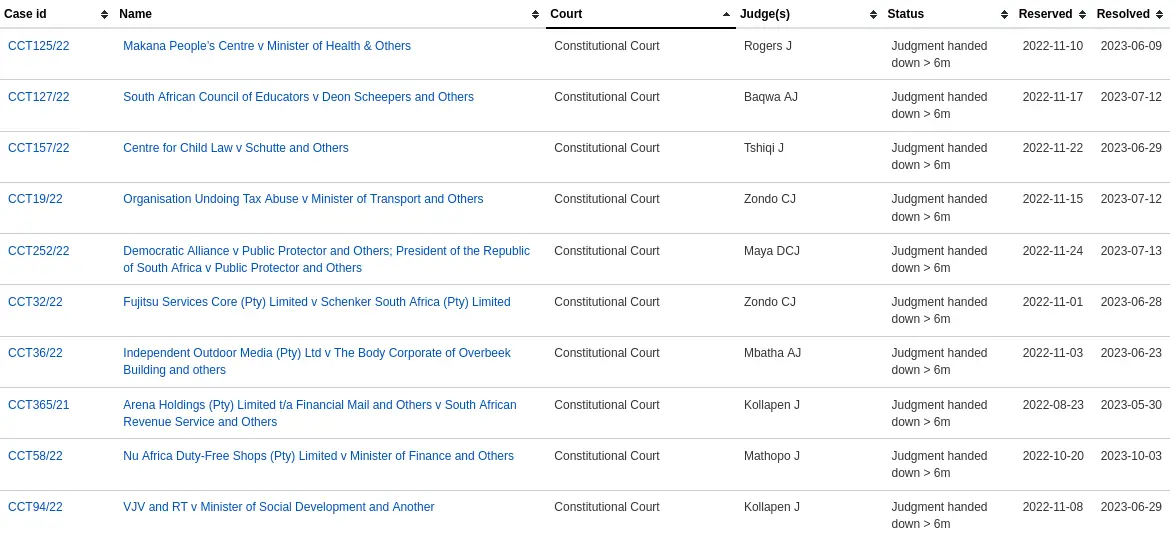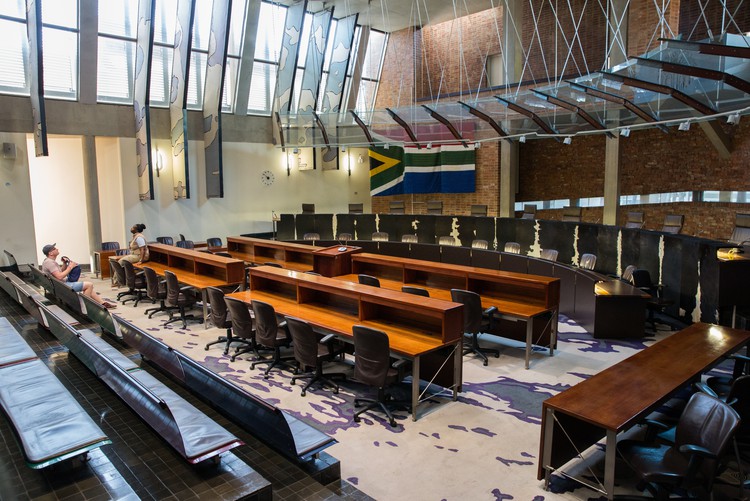Constitutional Court is delivering judgments late
And its website is out-of-date and poorly maintained
South Africa’s Constitutional Court is failing to deliver judgments on time. Archive photo: Ashraf Hendricks
- South Africa’s Constitutional Court is failing to deliver judgments timeously.
- The court’s website is also poorly maintained. Judgments which have already been handed down are still listed as “awaiting judgment”.
- The Office of the Chief Justice has failed to provide clarity on which judgments have already been delivered.
The Constitutional Court is setting a poor example by failing to deliver judgments timeously. South Africa’s apex court currently has four late judgments outstanding and many others have been delivered late this year. Moreover, the court’s website is poorly maintained, making it hard to know the status of cases.
The judicial norms and standards explain that judgments in both civil and criminal matters should generally not be reserved without a fixed date for handing them down.
But instead of delivering judgment immediately or soon after a hearing or the end of a trial, the court may decide to reserve judgment without a fixed date for handing it down.
The judicial norms and standards state that except for “exceptional cases where it is not possible to do so, every effort shall be made to hand down judgments no later than three months after the last hearing”.
GroundUp started reporting on late judgments in 2017 and we have used a more lenient six-month benchmark to classify a reserved judgment as late.
According to the last available Reserved Judgment Report for the Chief Justice, as of 31 December 2022, 181 judgments were outstanding for at least six months in courts across the country. In total, 901 judgments were reserved.
GroundUp has also started tracking the list of late judgments. Of judgments reserved by the Constitutional Court since August last year and that have since been handed down (delivered), ten were late using the six-month criterion. 19 were delivered late using the judicial norms and standard’s three-month criterion.

These are the ten Constitutional Court judgments listed on our system that were reserved since August 2022 and subsequently handed down more than six months after they were reserved, in breach of the Office of the Chief Justice’s norms and standards.
After GroundUp asked the Office of the Chief Justice (OCJ) last week about the 21 matters listed as “still awaiting judgment” on the Constitutional Court’s website, it seems to have been updated. The site now lists 18 outstanding judgments.
But some of the cases listed are years old even though they have been finalised, and other matters where we know judgments have already been delivered still feature on this list.
For example, judgment in Sasol Chevron Holdings and the Commissioner for the South African Revenue Service (SARS) was reserved on 4 May 2023. Judgment was handed down on 3 October 2023, but the Constitutional Court website still has it listed as awaiting judgment.
Another example is the matter between the South African Social Security Agency (SASSA) and life insurance company Lion of Africa over deductions from children’s grants. Judgment was already delivered on 26 May 2016, yet, it is listed as awaiting judgment on the court’s website. The site also lists Bonginkosi Khanyile v The State as reserved on 1 March 2017, but we understand that an order for this case was handed down.
Based on the Constitutional Court’s outstanding judgments list and excluding the above, there are four judgments reserved more than than six months ago that are still outstanding:
- Estelle Booysen (Born Swanepoel) v Jacobus Cornelius Van Eden N.O and Another (Reserved 18 August 2022)
- Robert Andrew Groves v The Minister of Police and Another (Reserved 14 February 2023)
- MC Olesitse N.O. v The Minister of Police (Reserved 16 February 2023)
- Tereza Rayment and Others v Minister of Home Affairs and Others (Reserved 28 February 2023)
GroundUp contacted the OCJ to establish which cases at the Constitutional Court had already been handed down and which were still outstanding. We sent questions more than a week ago and regularly followed up with the OCJ. The OCJ’s media team apologised for the delay and advised us that our enquiry “is receiving attention”. After sending several more requests for comment this week, the OCJ has stopped responding.
Support independent journalism
Donate using Payfast

Don't miss out on the latest news
We respect your privacy, and promise we won't spam you.
Next: Nandipha Magudumana’s latest bail attempt fails
Previous: Police brutality is a big problem. Here’s how to change the law to fix it
© 2023 GroundUp. This article is licensed under a Creative Commons Attribution-NoDerivatives 4.0 International License.
You may republish this article, so long as you credit the authors and GroundUp, and do not change the text. Please include a link back to the original article.
We put an invisible pixel in the article so that we can count traffic to republishers. All analytics tools are solely on our servers. We do not give our logs to any third party. Logs are deleted after two weeks. We do not use any IP address identifying information except to count regional traffic. We are solely interested in counting hits, not tracking users. If you republish, please do not delete the invisible pixel.

